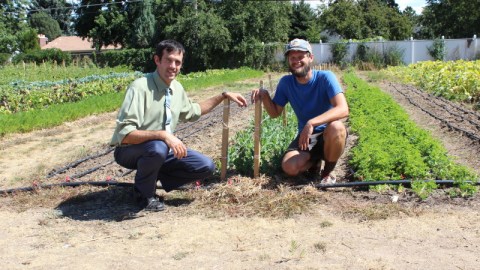Denver Green School seeds new innovation – growing their own food

The Denver Green School, classed as an Innovation Status school by the Denver Public School system, is trying out yet another innovation – growing their own food and serving it to students in their cafeteria.
Like everything in education, it’s a bit more complicated than it seems. A previously abandoned one-acre field behind the school has been taken over by Sprout City Farms, a project devoted to “innovative urban farms on underutilized land, rooting farmers in the city and bringing good food to neighborhoods.” The food grown is then sold back to the school to be served in the cafeteria. As you may imagine, there were lawyers involved at various steps of the process but Allen Potter, 6th Grade teacher and founding partner of the school, was quick to point out that school district lawyers “were actually our allies in this.”
Allen gave me a tour of the garden and indicated a remaining small patch of scrubby, weedy dirt. “All of this land looked like this. It was just crap. This is all productive land now.” He introduced me to Sprout City Farm Manager and Co-Founder Chad Hagedorn. Chad has the firm handshake and calm demeanor of any other farmer you might meet, even if his current spread is 50 feet from a jungle gym.
“We broke ground in March of 2011,” said Chad. The arrangement with the district took about 18 months in total. “Basically, the way we set it up to make it amenable with the school is that we would match the prices of their wholesale rates, so the same prices that they get from companies like Sysco for industrial agriculture, conventional produce, we would match those prices for onsite-grown, local, organically-grown produce. And that’s the way it was a palatable arrangement with the public school system. We lose money by selling for that low a rate but we can make up for it because we’re a non-profit through fund-raising, community support, and we get a lot of volunteer help.”
The garden is everything you would expect from a Colorado farm. Cucumbers, peppers, tomatoes, potatoes, tons of basil (enough for thousands of dollars worth of pesto), green onions, onions, squash, summer squash, all neatly laid out in rows in the midday sun under dozens of darting butterflies.
Back inside the cafeteria we sat with dining students and Meg Caley, Sprout City Farm Outreach Coordinator and also a Co-Founder. Meg is an earthy young woman with an infectious smile and she beamed as she told me what produce made it to the cafeteria that day. “Tomatoes, cabbage for the salad, cherry tomatoes, cucumbers, and green bell peppers.”
We gathered our trays of baked chicken and headed to the salad bar but we were largely too late – the students had cleaned out the tomatoes, cucumbers, and bell peppers. We made do with the salad and as we ate Allen told me more about the goals of the farm.
“Commodity products will be part of the picture for a long time because it’s free and the quality is actually improving. This is actually a reasonable piece of chicken, it’s baked, it’s got herbs on it, it’s yummy. But we’re trying to get to a point where much more of it is coming from our garden and local suppliers.”
I bit into a piece of tomato from my salad. It was richly flavored and sun-kissed as only fresh produce can be and I was slightly envious of the kids who ate the bulk of them.
Of course, the real audience for these grand plans sits at small desks and does homework in pencil. I asked some of Mr. Potter’s students what they thought of the new arrangement. They seemed impressed. “It’s really cool,” said Ashley Zolbayar. “It’s really healthy for us. It gets us moving and gets our bodies energized.” Amaya LeFrere agreed. “I like it because it’s fresh and it’s nice to see our garden improving.” Rebecca Egan thought the garden would be good for the general health of the student body. “I think that it’s good for students to be able to eat stuff straight from the garden.”
One student had reasonable concerns about pesticides. “I think it’s pretty cool but I don’t know what will happen if it’s not clean. You don’t know what chemicals can be on it,” said Trenton Palizzi. Another student, Abraham Thompson, was focused on the primary purpose of the farm. “I just want to eat. When people talk about food, it makes me hungry. Sometimes I don’t care about the food. I just want it in my mouth.”
To ensure that students understand the importance of where their food comes from before it is processed, packaged, sealed, delivered or served from a drive-through window, the school will be hosting a Harvest Festival in late October to teach students the importance of local food. And for these kids it doesn’t get much more local.
_____________________
Photo: Allen Potter and Chad Hagedorn/ by Chris Cunnyngham
Denver Green School Community Farm on Kickstarter
Other Recent Posts:
The (New) Great American Road Trip
Rick Perry and the Satanic Statue of Liberty
Could ‘UFO’ on the ocean floor really be the lost city of Kvenland?
Is 3D Printing Technology A Supervillain’s Best Friend?
Suspended Animation – The Strange Science of Captain America
var gaJsHost = (("https:" == document.location.protocol) ? "https://ssl." : "http://www.");
document.write(unescape("%3Cscript src='" + gaJsHost + "google-analytics.com/ga.js' type='text/javascript'%3E%3C/script%3E"));
// ]]>
try {
var pageTracker = _gat._getTracker("UA-11920094-1");
pageTracker._trackPageview();
} catch(err) {}
// ]]>




